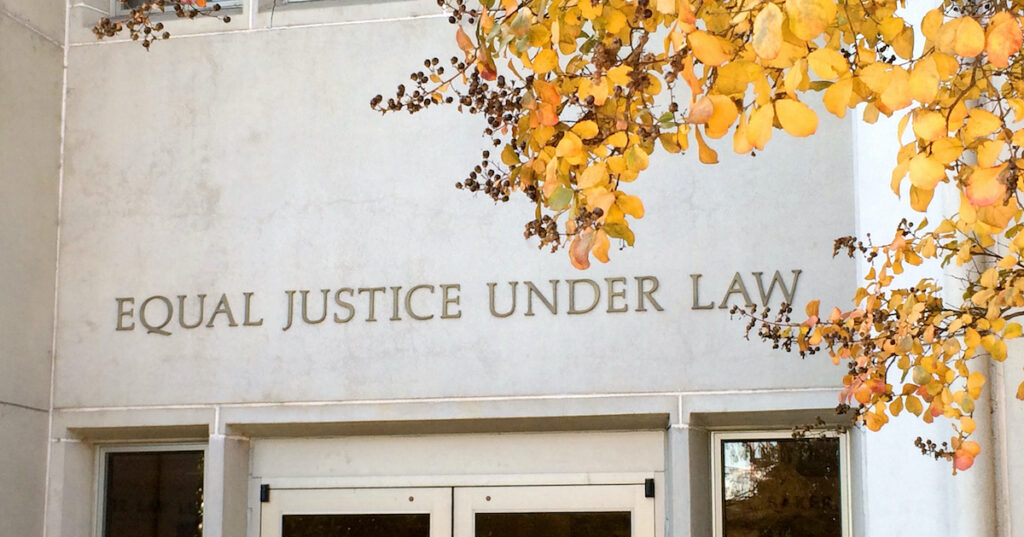Today the College of Law issued the following statement regarding the killing of George Floyd and the events that have followed.
We are deeply disturbed by the killing of George Floyd at the hands of police officers entrusted with upholding the law. We unequivocally condemn the acts of former officer Chauvin and the other officers who stood by and failed to help Mr. Floyd. Their conduct is reprehensible.
We also mourn the loss of Breonna Taylor, Ahmaud Arbery, Tamir Rice, Sandra Bland, Freddie Gray, and countless other black people whose lives have been cut short by systemic racism, violence, and injustice. Understandably, our black law students and many others in our community are feeling unspeakable pain, despair, loss, anger, grief, and fear. While we cannot fully feel what you feel, we grieve with you. Mr. Floyd’s death and the aftermath reveal what we know, but too often ignore. Equal justice in America is far from a reality. We understand that for so many of us, this moment feels unbearable. The waves of protest throughout our nation – and around the globe – give voice to generations of frustration, urgently demand justice, and require action.
As Chancellor Donde Plowman said in her recent statement, “Vol is a verb, and action is important.” We personally commit to take action and be part of the solution. We believe that lawyers, law students, and law schools have a unique duty to work to ensure that all forms of oppression are acknowledged and extinguished.
To this end, this spring, we began drafting a Diversity Action Plan with specific objectives and measurable outcomes that promote diversity, equity, and inclusion in our law school. The faculty will be reviewing the plan with the goal of finalizing and adopting it in September. The College of Law’s Community and Inclusion Committee is guiding the Diversity Action Plan process and has already consulted with groups of students, faculty, and staff in constructing the plan. We will continue to solicit suggestions for how to ensure that our college is an inclusive and supportive environment for everyone in our community.
Our clinic faculty members are also taking concrete steps to engage with the communities most harmed by systemic racism to learn how to be more responsive to their needs; to consciously engage our resources to address racism in the communities the clinic serves; and to find more space in classrooms and the curriculum for conversations about systemic racial inequity. And, the faculty as a whole is convening, beginning this week, to discuss other specific ways to increase understanding of the need for, and commitment to, meaningful change.
All of our work is on the table for discussion – teaching, research, and service. The faculty is committed to producing future lawyers with integrity, a passion for justice, and a commitment to service. Many in our faculty engage in scholarship that reflects our commitment to revealing and eradicating systemic injustice. We will continue to engage in that scholarship and will develop other resources that support change.
We both have been talking with many of our students to provide support and to ask what students need from us. We plan to broaden those conversations over the summer and when we return this fall. Our active, engaged, and talented student body is an important part of our community that helps drive our climate and culture. Now, more than ever, we look forward to working with our students, as well as others in the College of Law community, to learn from each other, teach each other, and take action to eliminate racism in our legal system and our communities.
These actions will require us to engage in difficult conversations, to question existing assumptions, to listen hard and well to those who have different experiences and perspectives. This is what lawyers do. The legacy of George Floyd – and countless others before him – deserves nothing less. As Cheri Beasley, North Carolina Supreme Court Chief Justice and UT Law alumna, said earlier this week, “We must do better; we must be better.”
The words “Equal Justice Under Law” are inscribed over the doors of the College of Law. We are both committed to doing better, being better, and ensuring that those words become a reality for everyone. We invite you to join our efforts.
Melanie D. Wilson
Dean of the College of Law
Douglas Blaze
Incoming Interim Dean of the College of Law
